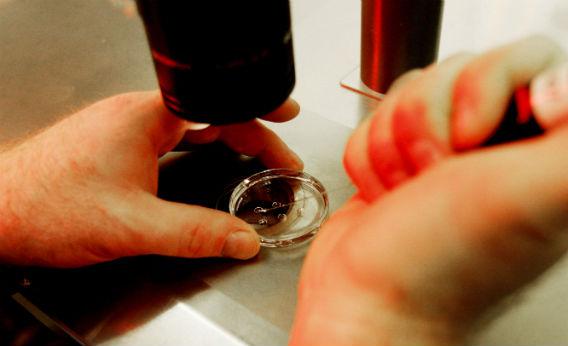When fortysomething Chicago native Ellie Lavi became a mother two years ago, she was a poster girl for creative baby-making. Lavi, a dual citizen of Israel and the United States, visited an Israeli clinic that helped her conceive twins from anonymously donated eggs and sperm. Since she lived in Israel, she gave birth there. And then she tried to apply for U.S. citizenship for her daughters—and the State Department rejected her case. The reason: Lavi could not prove that either the egg or sperm she used were donated by an American citizen. It didn’t matter that she carried the girls in her body, gave birth to them, and raised them.
The case has prompted the usual refrain in the medical and legal worlds about how the law hasn’t kept pace with the galloping advances of fertility science. Obviously, regulations that were intended to prevent abuses of U.S. immigration laws weren’t meant to punish Lavi’s children. “She wasn’t trying to smuggle a baby into this country,” says Sanford Benardo, a Boston-based lawyer who specializes in assisted reproductive technology. “She’s the legal mother. She has financial responsibility. She’s on the birth certificate.” The story gives one a little kick in the gut because Lavi could have easily prevented this problem by hopping on an El Al flight and having her babies on American soil. So why didn’t she know better? Why didn’t her clinic warn her? How could something this important fall through the cracks?
Legal experts say that Lavi’s situation isn’t that common, especially since the State Department manual includes provisions for Americans seeking fertility care abroad, as long as one parent can prove a blood relation to the child. More often, it’s actually foreigners traveling to our shores for what’s called “fertility tourism” who are the ones at risk. The United States has the least regulated fertility industry in the world. So people from abroad come here for everything we allow here that’s barred in their home countries.
For example, Italy and many Muslim countries prohibit the use of donated sperm or eggs. A Turkish woman who becomes inseminated abroad with donor sperm faces three years in prison. Several Australian states don’t allow gay or single people to use assisted reproduction. Other countries allow patients to use donated sperm, but not samples given anonymously. Britain and Canada allow the use of donated eggs, but not when the provider was paid. France prohibits all kinds of surrogacy.
Not surprisingly, problems arise when foreigners come here to get around these rules and then try to take their children home. In one case, a Belgian gay couple traveled to California and hired a surrogate to carry their baby. But when they returned to Belgium, the government refused to acknowledge the nonbiological father. Then there’s the story of a French couple that used a surrogate in Minnesota. The French government refused to allow the couple (in which the man was the biological father) to claim French citizenship for the baby or even adopt their own child. To avoid these problems, parents have to consult lawyers who know the ropes. Since the United Kingdom won’t acknowledge American “pre-birth” court orders that transfer parentage rights to the couple hiring a surrogate, John Husson, a lawyer from Colorado Springs, advises his British clients to have their lawyers at home address this in the last few months before the births.
The rules of some foreign countries even prevent some patients from receiving American care at all. David Adamson, a fertility doctor from Palo Alto, Calif., said he was forced to refuse to treat an Australian woman who wanted to use donor eggs and have the leftover embryos shipped home. Since her home state forbade the use of paid donors, she asked Dr. Adamson to leave off the origin of the eggs on the shipping package that’s required by the Food and Drug Administration guidelines. “Her doctor said he couldn’t accept the embryos,” says Adamson.
The legal and cultural mashups of different countries are only likely to get worse as the world’s citizens continue to push back the age of parenting, and single and gay people explore new family formations. As such, legal and patient advocates frequently call for broad international laws to make fertility tourism easier. Or at the least, for syncing up different medical insurance systems. There have been a handful of cases in which foreigners hiring American surrogates abandoned their babies after they appeared to suffer from birth defects. The would-be parents were scared their national insurance policies wouldn’t cover months of expensive neonatal care in American hospitals.
No standardized laws are on the horizon, however. Until then, the onus is on patients to make sure they understand what they’re getting into. The dilemma is that caution often isn’t the mindset of patients exploring the frontier of fertility science. People who desperately want to become parents generally aren’t focused on court orders and immigration laws. Instead, they are trying to embrace new ways of conceiving children in which the lines between genetic and biological parenthood are, for them, blessedly blurred. Ellie Lavi, for example, probably didn’t care about the nationality of her anonymous DNA donors as she felt the babies swimming in her belly begin to kick. She was making the emotional leap to becoming their mother.
